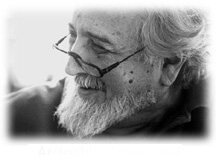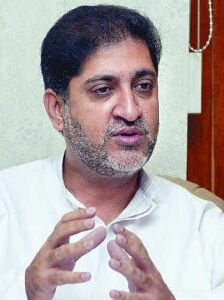| Baloch Society Of North America (BSO_NA) Baloch Society Of North America (BSO_NA) is Non-Profit Organization, working to unite and Organize all Baloch in North America, to expose the Occupation of our land (Balochistan) and exploitations of our resources by Pakistani and Iranian Governments, and to bring their Human Rights Violations in Balochistan into the world’s Notice. |
On April 5, 2006, while Akhtar was taking his son to school here in Karachi, two motorcyclists, both with pillion
riders, followed his car. On his way back home, with them still following, Akhtar stopped his car and asked them
who they were, why he was being followed, and what they wanted of him. They refused to give any satisfactory
answer.
Then, perhaps rather foolishly, four of his tribesmen guards picked up the two riders of one motorcycle and
carried them back to Akhtar’s house intending to hand them over to the police, at which stage the two admitted to
being army personnel. Almost immediately, a large posse of law enforcement agency men (LEA) arrived at the
house, took away their two companions who had been picked up, and laid siege to the house and its occupants.
On April 11, Iqbal Haider, secretary-general of the Human Rights Commission of Pakistan (HRCP) along with a
group of fellow commission members, visited Akhtar’s house and were allowed entry by the LEA custodians.
That same night all personnel were withdrawn from the house and Akhtar and his family were free to come and
go.
At some later stage, it was found that a havildar of the Pakistan Army, one Qurban Hussain, had filed on April 5
2006 an FIR (170/06) at Darakshan Police Station against Akhtar and the four concerned guards. On the basis of
this FIR, a case (8/06) was registered in the Anti-Terrorism Court-V (ATC), Karachi. When Akhtar’s relatives
attempted to file an FIR against the LEAs, it was refused. A constitutional petition (D-1917/06) was filed on Akhtar’
s behalf in the Sindh High Court asking that an FIR be accepted and registered. On October 13, the court
restrained the ATC from pronouncing a judgment against the four accused. The restraining order is still in force
and the petition is due to be heard on January 23 2007.
Despite this restraining order, Akhtar’s four guards named in the FIR, who were under arrest, were convicted on
December 9, 2006, by the ATC and sentenced to several terms of imprisonment, including life, for each of the
offences and each was fined Rs.140,000.
Akhtar himself remained free to move about at will, which he did, speaking at public meetings in various places
in Balochistan, and continuing with his normal political life until November 28 when he was arrested, together
with 14 of his partymen, by the Balochistan police and taken to Lassi Farm House in Hub Town, which was
declared a sub-jail. He was kept there until December 26 when his arrest was disclosed and he was produced
before the same ATC. His 14 companions were removed to an undisclosed destination. Their whereabouts
remain unknown – they have simply disappeared.
Akhtar’s trial in the ATC started in the usual court premises but it was later decided that he would be tried in
Central Prison, Karachi, the date of the first hearing being fixed for January 8. On learning of this, Iqbal Haider
sought permission from the superintendent of the prison and attended the hearing on January 8. It was granted
(but only for one representative of the HRCP). Iqbal, as reported in this newspaper on January 9, was horrified to
hear from Akhtar of the treatment meted out to him.
In the court room, he “had been forced to sit in an iron cage away from his counsel. ‘He is being denied even the
most basic amenities, such as bedding and a pillow, medical treatment, home food and permission to see his
relatives,’ Mr Haider said.” Akhtar had stated in court that though he was in prison on judicial remand, his
custody was being controlled by Military Intelligence.
On January 10, a news report was carried in this newspaper under the heading “Govt denies HRCP claim.” The
report about the iron cage is not based on fact, said a government spokesperson, one Nishat Ahmad Khan, and
“the trial is being conducted at the request of the police and Home Department, Sindh, for safety of his life as he
has old enmity and simmering disputes in his home district, Khuzdar.” According to the spokesperson, Akhtar is
“being kept in a room where he is regularly meeting his family members.” The funny part is that the
spokesperson also stated that Iqbal Haider had “intruded into the court [inside the prison] without permission.”
On January 12, Dawn printed a news item stating that the HRCP had refuted the government’s denial and
reiterated Iqbal’s statement printed on January 9.
Who would one rather believe – Iqbal Haider, a senior advocate, an officer of the Supreme Court, and secretary-
general of the HRCP or one of the ubiquitous ‘government spokespersons’? There is an easy answer to that.
Speaking to Iqbal on the news reports, I requested him to tell me, in his own words, about the cage and repeat
part of his e-mail message to me on the subject : “In the court room, I was surprised to find that by installing iron
bars from floor to ceiling and covering those iron bars with an iron net, a sort of cage had been created in a
corner of the court room for the accused. This iron cage had a separate iron gate at its rear. Mr Mengal was
brought into this iron cage from a separate backdoor when the presiding officer started the proceedings. Mr
Mengal was not allowed to sit with his advocates nor was any member of his family allowed to witness the
proceedings. I requested the court to allow him to sit alongside his lawyers but the court merely ignored me.”
Akhtar has moved three applications, one seeking the provision of medical attention, a second asking that he be
given ‘B’ class accommodation, and the third for his release on bail. The hearing of all the applications was
deferred. The reason given for the deferment of the ‘B’ class application was that no income tax certificate was
available, but when on January 10, a certificate was produced to the presiding officer, no order was passed. The
next hearing of the case of the man in the iron cage is fixed for January 20, 2007, on which day the incompetent
members of the government of Sindh hope to be celebrating a festival of sorts of their own making at which, as
is the term here, ‘the highest in the land’ will participate.
On January 10, when senior advocate Mr Azizullah Sheikh arrived at Karachi Central Prison to have his
vakalatnama signed by his client, Akhtar Mengal, he was denied access to him. Iqbal also, that same day, was
refused permission to meet Akhtar.
As editorialised in this newspaper on January 10, this is a ‘deplorable’ situation. The press has also reported
that this January 11, after the passage of almost seven years, President General Pervez Musharraf has taken
“serious notice of the worsening law and order situation in the country. . . . “. Should he not at last do so? After all,
we have all been hyper-worried about it for years. The general is not pleading helplessness. We can only hope
that good sense will prevail.
http://dawn.com/weekly/cowas/20070114.htm
Related Links:
riders, followed his car. On his way back home, with them still following, Akhtar stopped his car and asked them
who they were, why he was being followed, and what they wanted of him. They refused to give any satisfactory
answer.
Then, perhaps rather foolishly, four of his tribesmen guards picked up the two riders of one motorcycle and
carried them back to Akhtar’s house intending to hand them over to the police, at which stage the two admitted to
being army personnel. Almost immediately, a large posse of law enforcement agency men (LEA) arrived at the
house, took away their two companions who had been picked up, and laid siege to the house and its occupants.
On April 11, Iqbal Haider, secretary-general of the Human Rights Commission of Pakistan (HRCP) along with a
group of fellow commission members, visited Akhtar’s house and were allowed entry by the LEA custodians.
That same night all personnel were withdrawn from the house and Akhtar and his family were free to come and
go.
At some later stage, it was found that a havildar of the Pakistan Army, one Qurban Hussain, had filed on April 5
2006 an FIR (170/06) at Darakshan Police Station against Akhtar and the four concerned guards. On the basis of
this FIR, a case (8/06) was registered in the Anti-Terrorism Court-V (ATC), Karachi. When Akhtar’s relatives
attempted to file an FIR against the LEAs, it was refused. A constitutional petition (D-1917/06) was filed on Akhtar’
s behalf in the Sindh High Court asking that an FIR be accepted and registered. On October 13, the court
restrained the ATC from pronouncing a judgment against the four accused. The restraining order is still in force
and the petition is due to be heard on January 23 2007.
Despite this restraining order, Akhtar’s four guards named in the FIR, who were under arrest, were convicted on
December 9, 2006, by the ATC and sentenced to several terms of imprisonment, including life, for each of the
offences and each was fined Rs.140,000.
Akhtar himself remained free to move about at will, which he did, speaking at public meetings in various places
in Balochistan, and continuing with his normal political life until November 28 when he was arrested, together
with 14 of his partymen, by the Balochistan police and taken to Lassi Farm House in Hub Town, which was
declared a sub-jail. He was kept there until December 26 when his arrest was disclosed and he was produced
before the same ATC. His 14 companions were removed to an undisclosed destination. Their whereabouts
remain unknown – they have simply disappeared.
Akhtar’s trial in the ATC started in the usual court premises but it was later decided that he would be tried in
Central Prison, Karachi, the date of the first hearing being fixed for January 8. On learning of this, Iqbal Haider
sought permission from the superintendent of the prison and attended the hearing on January 8. It was granted
(but only for one representative of the HRCP). Iqbal, as reported in this newspaper on January 9, was horrified to
hear from Akhtar of the treatment meted out to him.
In the court room, he “had been forced to sit in an iron cage away from his counsel. ‘He is being denied even the
most basic amenities, such as bedding and a pillow, medical treatment, home food and permission to see his
relatives,’ Mr Haider said.” Akhtar had stated in court that though he was in prison on judicial remand, his
custody was being controlled by Military Intelligence.
On January 10, a news report was carried in this newspaper under the heading “Govt denies HRCP claim.” The
report about the iron cage is not based on fact, said a government spokesperson, one Nishat Ahmad Khan, and
“the trial is being conducted at the request of the police and Home Department, Sindh, for safety of his life as he
has old enmity and simmering disputes in his home district, Khuzdar.” According to the spokesperson, Akhtar is
“being kept in a room where he is regularly meeting his family members.” The funny part is that the
spokesperson also stated that Iqbal Haider had “intruded into the court [inside the prison] without permission.”
On January 12, Dawn printed a news item stating that the HRCP had refuted the government’s denial and
reiterated Iqbal’s statement printed on January 9.
Who would one rather believe – Iqbal Haider, a senior advocate, an officer of the Supreme Court, and secretary-
general of the HRCP or one of the ubiquitous ‘government spokespersons’? There is an easy answer to that.
Speaking to Iqbal on the news reports, I requested him to tell me, in his own words, about the cage and repeat
part of his e-mail message to me on the subject : “In the court room, I was surprised to find that by installing iron
bars from floor to ceiling and covering those iron bars with an iron net, a sort of cage had been created in a
corner of the court room for the accused. This iron cage had a separate iron gate at its rear. Mr Mengal was
brought into this iron cage from a separate backdoor when the presiding officer started the proceedings. Mr
Mengal was not allowed to sit with his advocates nor was any member of his family allowed to witness the
proceedings. I requested the court to allow him to sit alongside his lawyers but the court merely ignored me.”
Akhtar has moved three applications, one seeking the provision of medical attention, a second asking that he be
given ‘B’ class accommodation, and the third for his release on bail. The hearing of all the applications was
deferred. The reason given for the deferment of the ‘B’ class application was that no income tax certificate was
available, but when on January 10, a certificate was produced to the presiding officer, no order was passed. The
next hearing of the case of the man in the iron cage is fixed for January 20, 2007, on which day the incompetent
members of the government of Sindh hope to be celebrating a festival of sorts of their own making at which, as
is the term here, ‘the highest in the land’ will participate.
On January 10, when senior advocate Mr Azizullah Sheikh arrived at Karachi Central Prison to have his
vakalatnama signed by his client, Akhtar Mengal, he was denied access to him. Iqbal also, that same day, was
refused permission to meet Akhtar.
As editorialised in this newspaper on January 10, this is a ‘deplorable’ situation. The press has also reported
that this January 11, after the passage of almost seven years, President General Pervez Musharraf has taken
“serious notice of the worsening law and order situation in the country. . . . “. Should he not at last do so? After all,
we have all been hyper-worried about it for years. The general is not pleading helplessness. We can only hope
that good sense will prevail.
http://dawn.com/weekly/cowas/20070114.htm
Related Links:
-
Baloch leader remanded to police custody.
-
Mengal fears his detained son might be killed
-
KARACHI: Counsel seeks better jail class for Akhtar Mengal
-
ATC adjourns Akhtar Mengal’s trial
-
Mengal being mistreated in confinement: HRCP
-
SHC orders Mengal’s medical check-up
-
Mengal challenges in-camera trial
-
Human Rights group slams trial of former Baloch CM
-
Balochistan HC moved on release of Mengal’s 14 missing associates
-
HRCP says Mengal kept in iron cage
-
ATC adjourns Mengal case to 20th
-
Jirga called to discuss Mengal’s arrest
-
BSF demands release of Mengal


The man
in the iron
cage
By Ardeshir Cowasjee
in the iron
cage
By Ardeshir Cowasjee
‘THEY’ killed one former chief minister of Balochistan (also a former
governor) in the August 2006 shoot-out at the Kohlu corral, when
Nawab Mohammad Akbar Khan Bugti went up in his gory blaze of
glory. ‘They’ have learnt nothing, neither have ‘they’ been reined in.
‘They’ have now incarcerated, and humiliated, in Karachi Central
Prison another former chief minister of that unhappy deranged
province of Balochistan, Akhtar Mengal of the Balochistan National
Party, son of Ataullah.

